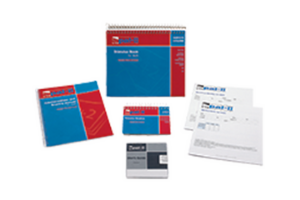Author:
Virginia Wise Berninger, PhD
Overview:
Investigate the cognitive processes related to math
Age Range:
Grades K to 6
Administration:
Paper-and-pencil
Scoring Option:
Manual Scoring
RTI Tiers:
RTI Levels 1, 2 and 3
Completion Time:
Varies depending on subtests selected by the examiner
Norms:
Scaled Scores and base rates
Publication Date:
2007
The only test to investigate the cognitive processes related to math
PAL-II Math measures the development of cognitive processes that are critical to learning math skills and actual math performance. Appropriate as either Tier 1, Tier 2 or Tier 3 evaluation tool.
PAL-II Math
- Introduces novel quantitative and spatial working memory tasks associated with math computation skills
- Aligns with the National Mathematics Advisory Panel and the National Research Councilrecommendations
- Provides evidence-based diagnostics for dyscalculia
- Guides early identification/intervention planning by customizing your evaluation
- Provides brief application and interpretation based on referral concern or as follow up to earlier assessment
Features & Benefits
- Easier to administer with the PAL-II User’s Guide
- Referral driven customization
- Recommends resources and types of interventions based on the assessment results
- Offers flexible administration—brief or comprehensive based on the referral needs
A link to the PAL–II User’s Guide is provided in your purchased kit so examiners can use it readily in their daily practice for multiple purposes, including:
- Reviewing the essentials of test administration prior to assessment
- Reviewing test interpretation prior to preparation of an assessment report
- Designing an early intervention program and progress monitoring plan in a specific academic domain
- Engaging in problem-solving consultation for specific reasons for referral
- Performing differential diagnosis and treatment planning for preparing an Individual Education Plan (IEP)
User’s Guide
PAL-II User’s Guide CD:
- Provides recommendations on subtest administration based on referral concerns and child’s grade level
- Describes each subtest and how each construct affects math skills with score interpretation
- Recommends resources and types of interventions based on the assessment results
- Provides recommendations and suggestions for resources and types of interventions based on the assessment results
- Offers easy access to technical information such as development of the test, reliability studies, and validity studies
Reference Materials
PAL-II Math Brochure (PDF- 158 KB)
PAL-II Diagnostic for Math (PAL-II Math) has subtests aligned with recommendations in the Final Report of the National Mathematics Advisory Panel (NMAP) and the Adding It Up Report of the National Research Council. We have outlined the target math skills and the recommended PAL-II Math subtest to administer for identifying students with weaknesses in the target math skill for purposes of supplementary instruction to master the skill. You can access these summaries by viewing either below.
National Mathematics Advisory Panel Final Report
To prepare K to 6 students for success in algebra in middle school and high school, students need to develop these skills in elementary school. (page 19, NMAP)
| Target Skills |
Related PAL-II Subtests |
| 1. Key Target Skills |
| Conceptual Understanding |
- Oral Counting
- Place Value
- Part-Whole Relationships (Time)
|
| Computational Fluency |
- Fact Retrieval
- Computation Operations
- Finding the Bug
|
| Problem Solving |
- Multi-Step Problem Solving
- Place Value (Part C)
- Part-Whole Relationships (Time)
- Quantitative Working Memory
|
| 2. Other Targeted Skills |
| Number Sense (page 27, NMAP) |
|
|
Oral Counting |
|
|
Place Value |
- Basic Arithmetic Operations (addition, subtraction, multiplication, division)
|
- Math Fact Retrieval
- Computation Operations
|
| Fluency with whole numbers (page 17, NMAP) |
|
|
Place Value |
- Basic Operations (Algorithms)
|
- Fact Retrieval
- Computation Operations
- Finding the Bug
|
- Applying Operations to Problem Solving
|
- Multi-Step Problem Solving
- Place Value (Part C)
- Part-Whole Relationships (Time)
- Quantitative Working Memory
|
- Automatic Recall of Number Facts
|
Fact Retrieval |
| Fluency with Fractions and Decimals (page 18, NMAP) |
- Part-Whole Relationships (fractions and mixed numbers)
|
Part-Whole Fractions and Mixed Numbers |
- Place Value (whole numbers + decimals)
|
Place Value |
Adding It Up (National Research Council, page 16)—5 Attributes of Proficiency
| Target Skills |
Related PAL-II Subtests |
| 1. Conceptual Understanding |
- Oral Counting
- Place Value
- Part-Whole Relationships
|
| 2. Procedural Fluency |
Computational Operations—Verbal Explanation and Problem Solution |
3. Strategic Competence
(formulate and represent math problems) |
- Multi-Step Problem Solving
- Part-Whole Time
|
| 4. Adaptive Reasoning (e.g. explanation) |
Computation Operations— Verbal Explanation |
5. Procedural Disposition
(seeing math as sensible) |
- Place Value—Problem Response Written
- Finding the Bug
- Part-Whole Concept
|
Pre-recorded Webinars
-
PAL-II: Overview of the Process Assessment of the Learner-Second Edition
Presenter: Gloria Maccow, PhD
PAL-II Reading and Writing and PAL-II Math are comprehensive, research-based assessment systems. The instruments can be used at three tiers ranging from prevention to problem solving consultation to differential diagnosis. PAL-II Reading and Writing links to targeted evidence-based interventions and lessons. During this 1-hour webinar, participants will learn about the three-tiered approach to assessment described by Dr. Virginia Berninger, author of the PAL-II. The presenter will describe how the components of the PAL-II are used to prevent academic problems and to identify targeted interventions for struggling students.
Date: Nov 15, 2011


-
PAL-II Advanced: Tiered Assessment and Intervention
Presenter: Amy Dilworth Gabel, PhD
PAL-II Reading and Writing and PAL-II Math are comprehensive, research-based assessment systems. The instruments can be used at three tiers ranging from prevention to problem solving consultation to differential diagnosis. PAL-II Reading and Writing links to targeted evidence-based interventions and lessons. During this webinar, participants will learn about the three-tiered approach to assessment described by Dr. Virginia Berninger, author of the PAL-II. The presenter will describe how the components of the PAL-II are used to prevent academic problems and to identify targeted interventions for struggling students. As a result of this presentation, participants will
- Describe the reading, writing, and math skills students are expected to master at specified grade levels;
- Discuss the cognitive processes that are critical to acquisition of reading, writing, and math skills;
- Describe how to choose an intervention based on analysis of a student’s performance of a skill and mastery of the cognitive processes needed to perform the skill.
Date: Dec 02, 2010








